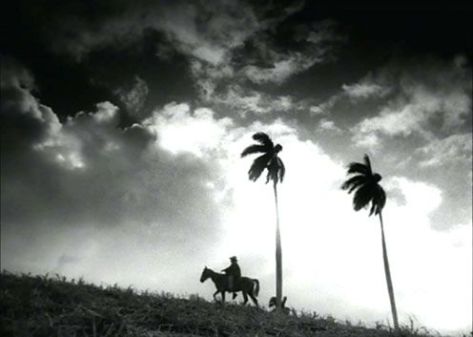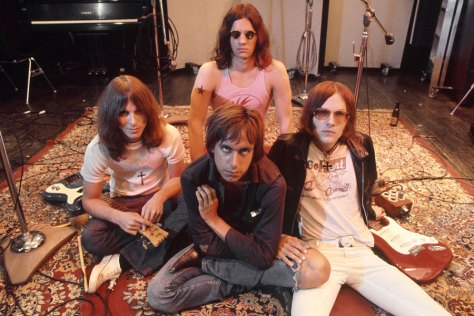By Dennis Hartley
(Originally posted on Digby’s Hullabaloo on November 26, 2016)

Time, he’s waiting in the wings
He speaks of senseless things
His script is you and me, boys
-from “Time” by David Bowie
So the dictator who once inspired a documentary entitled 638 Ways to Kill Castro was finally taken out by time-honored method #639: Patience. Whether you are happy, sad or ambivalent regarding the passing of Fidel Castro, it’s inarguable that it’s been a long, strange trip for U.S.-Cuban relations since the Teflon strongman seized power in 1959.
In light of this development, I’m re-running a post that was originally inspired by Secretary of State John Kerry’s historic visit to the island-nation in October of last year:

There’s just something about (Castro’s) Cuba that affects (U.S. presidential) administrations like the full moon affects a werewolf. There’s no real logic at work here.
-an interviewee from the documentary 638 Ways to Kill Castro
The Obama administration’s decision to restore diplomatic ties with Cuba is the latest foreign policy misstep by this President…
–from Gov. Jeb Bush’s official Facebook statement, December 2014
Pardon me for interrupting, Jeb. October of 1962 just called…it wants its zeitgeist back.
–the author of this post
Although you wouldn’t guess it from the odd perfunctory mention that managed to squeeze in edgewise through the ongoing 24/7 Donald Trump coverage dominating the MSM, that flag raising at the American embassy in Cuba yesterday, coinciding with the first official visit by a U.S. Secretary of State in 70 (seventy) years was kind of a big deal.
Wasn’t it?
Maybe it’s just me (silly old peacenik that I am). Anyway, in honor of this auspicious occasion, here are my picks for the top 10 films with a Cuban theme. Alphabetically:
Bananas– Yes, I know. This 1971 Woody Allen film takes place in the fictional banana republic of “San Marcos”, but the mise en scene is an obvious stand-in for Cuba. There are also numerous allusions to the Cuban revolution, not the least of which is the ridiculously fake beard donned at one point by hapless New Yawker Fielding Mellish (Allen) after he finds himself swept up in Third World revolutionary politics. Naturally, it all starts with Allen’s moon-eyed desire for a woman completely out of his league, an attractive activist (Louise Lasser). The whole setup is utterly absurd…and an absolute riot. This is pure comic genius at work. Howard Cosell’s (straight-faced) contribution is priceless. Allen co-wrote with his Take the Money and Run collaborator, Mickey Rose.
Buena Vista Social Club- This engaging 1999 music documentary was the brainchild of musician Ry Cooder, director Wim Wenders, and the film’s music producer Nick Gold. Guitarist/world music aficionado Cooder coaxes a number of venerable Cuban players out of retirement (most of whom had their careers rudely interrupted by the Revolution and its aftermath) to cut a collaborative album, and Wenders is there to capture what ensues (as well as ever-cinematic Havana) in his inimitable style. He weaves in footage of some of the artists as they make their belated return to the stage, playing to enthusiastic fans in Europe and the U.S. It’s a tad over-praised, but well worth your time.
Che– Let’s get this out of the way. Ernesto “Che” Guevara was no martyr. By the time he was captured and executed by CIA-directed Bolivian Special Forces in 1967, he had put his own fair share of people up against the wall in the name of the Revolution. Some historians have called him “Castro’s brain”.
That said, there is no denying that he was a complex, undeniably charismatic and fascinating individual. By no means your average revolutionary guerrilla leader, he was well-educated, a physician, a prolific writer (from speeches and essays on politics and social theory to articles, books and poetry), a shrewd diplomat and had a formidable intellect. He was also a brilliant military tactician.
Steven Soderbergh and his screenwriters (Peter Buchman and Benjamin A. Van Der Veen) adapted their 4 ½ hour opus from Guevara’s autobiographical accounts. Whereas Part 1 (aka The Argentine) is a fairly straightforward biopic, Part 2 (aka Guerilla) reminded me of two fictional films with an existential bent, both also set in torpid South American locales-Clouzot’s The Wages of Fear and Herzog’s Aguirre, the Wrath of God. Like the doomed protagonists in those films, Guevara is fully committed to his journey into the heart of darkness, and has no choice but to cast his fate to the wind and let it all play out. Star Benicio del Toro shines.
The Godfather, Part II– While Cuba may not be the primary setting for Francis Ford Coppola’s superb 1974 sequel to The Godfather, it is the location for a key section of the narrative where powerful mob boss Michael Corleone (Al Pacino) travels to pre-Castro Havana to consider a possible business investment. He has second thoughts after witnessing a disturbing incident involving an anti-Batista rebel. And don’t forget that the infamous “kiss of death” scene takes place at Batista’s opulent New Year’s Eve party…just as the guests learn Castro and his merry band of revolutionaries have reached the outskirts of the city and are duly informed by their host…that they are on their own! And remember, if you want to order a banana daiquiri in Spanish, it’s “banana daiquiri”.
Harold and Kumar Escape from Guantanamo Bay– Picking up where they left off in their surprise stoner comedy hit Harold and Kumar Go to White Castle, roomies Harold (John Cho) and Kumar (Kal Penn) excitedly pack their bags for a dream European vacation in weed-friendly Amsterdam. Unbeknownst to Harold, Kumar has smuggled his new invention, a “smokeless” bong, on board.
When a “vigilant” passenger, already eyeballing Kumar with suspicion due to his ethnic appearance, catches a glimpse of him attempting to fire up his homemade contraption in the bathroom, all hell breaks loose. Before they know it, Harold and Kumar have been handcuffed by on-board air marshals, given the third degree back on the ground by a jingoistic government spook and issued orange jumpsuits, courtesy of the Gitmo quartermaster.
Through circumstances that could only occur in Harold and Kumar’s resin-encrusted alternate universe, they break out of Cuba, and hitch a boat ride to Florida. This sets off a series of cross-country misadventures. As in the first film, the more ridiculously over-the-top their predicament, the funnier it gets. It’s crass, even vulgar; but it’s somehow good-naturedly crass and vulgar, in a South Park kind of way (i.e. the goofiness is embedded with sharp political barbs).
I Am Cuba– There is a knee-jerk tendency in some quarters to dismiss this 1964 film about the Cuban revolution out of hand as pure Communist propaganda, and little else. Granted, it was produced with the full blessing of Castro’s regime, who partnered with the Soviet government to provide the funding for Russian director Mikhail Kalatozov’s sprawling epic.
Despite the dubious backing, the director was given a surprising amount of artistic leeway; what resulted was, yes, from one perspective a propagandist polemic, but also a visually intoxicating cinematic masterpiece that remains (accolades from cineastes and critics aside) curiously unheralded. The narrative is divided into a quartet of one-act dramas about Cuba’s salt of the earth; exploited workers, dirt-poor farmers, student activists, and rebel guerrilla fighters. However, the real stars here are the director and his technical crew, who leave you pondering how in the hell they produced some of those jaw-dropping set pieces.
The Mambo Kings– Look in the dictionary under “pulsating”, and you will likely see the poster for Arme Glimcher’s underrated 1992 melodrama about two musician brothers (Armand Assante and Antonio Banderas) who flee Cuba in the mid-1950s to seek fame and fortune in America. Hugely entertaining, with fiery performances by the two leads, great support from Cathy Moriarty and Maruschka Detmers, topped off by a fabulous soundtrack. Tito Puente gives a rousing cameo performance, and in a bit of stunt casting Desi Arnaz, Jr. is on hand to play (wait for it) Desi Arnaz, Sr. (who helps the brothers get their career going). Cynthia Cidre adapted her screenplay from Oscar Hijuelos’ novel.
Our Man in Havana– A decade after their collaboration on the 1949 classic, The Third Man, director Carol Reed and writer Graham Greene reunited for this wonderfully droll 1960 screen adaptation of Greene’s seriocomic novel. Alec Guinness gives one of his more memorable performances as an English vacuum cleaner shop owner living in pre-revolutionary Havana. Strapped for cash, he accepts an offer from Her Majesty’s government to do a little moonlighting for the British Secret Service. Finding himself with nothing to report, he starts making things up so he can stay on the payroll. Naturally, this gets him into a pickle as he keeps digging himself into a deeper hole. Reed filmed on location, which gives us an interesting snapshot of Havana on the cusp of the Castro era.
Scarface– Make way for the bad guy. Bad guy comin’ through. Tony Montana (Al Pacino) is a bad, bad, bad, bad man, a Cuban immigrant who comes to America as part of the 1980 Mariel boat lift. A self-proclaimed “political refugee”, Tony, like the millions of immigrants before him who made this country great, aims to secure his piece of the American Dream. However, he’s a bit impatient. He espies a lucrative shortcut via Miami’s thriving cocaine trade, which he proves very adept at (because he’s very ruthless). Everything about this film is waaay over the top; Pacino’s performance, Brian De Palma’s direction, Oliver Stone’s screenplay, the mountains of coke and the piles of bodies. Yet, it remains a guilty pleasure; I know I’m not alone in this (c’mon, admit it!).
638 Ways to Kill Castro- History buffs (and conspiracy-a-go-go enthusiasts) will definitely want a peek at British director Dolan Cannell’s documentary. Mixing archival footage with talking heads (including a surprising number of would-be assassins), Cannell highlights some of the attempts by the U.S. government to knock off Fidel over the years. The number (638) of “ways” is derived from a list compiled by former members of Castro’s security team.
Although Cannell initially plays for laughs (many of the schemes sound like they were hatched by Wile E. Coyote) the tone becomes more sobering. The most chilling revelation concerns the 1976 downing of a commercial Cuban airliner off Barbados (73 people killed). One of the alleged masterminds was Orlando Bosch, an anti-Castro Cuban exile living in Florida (he had participated in CIA-backed actions in the past).
When Bosch was threatened with deportation in the late 80s, many Republicans rallied to have him pardoned, including Florida congresswoman Ileana Ross, who used her involvement with the “Free Orlando Bosch” campaign as part of her running platform. Her campaign manager was a young up and coming politician named (wait for it) Jeb! Long story short? Jeb’s Pappy then-president George Bush Sr. granted Bosch a pardon in 1990. Oh, what a tangled web, Jeb! BTW, Bosch was once publicly referred to as an “unrepentant terrorist” by the Attorney General.
# UPDATE [11-28-16] #
I’m not the only one with Fidel on the brain…I received a flurry of emails from readers, who offer these excellent recommendations:
h/t to Michael I., Douglas W., Michael H., Carl C., & Timothy S.













